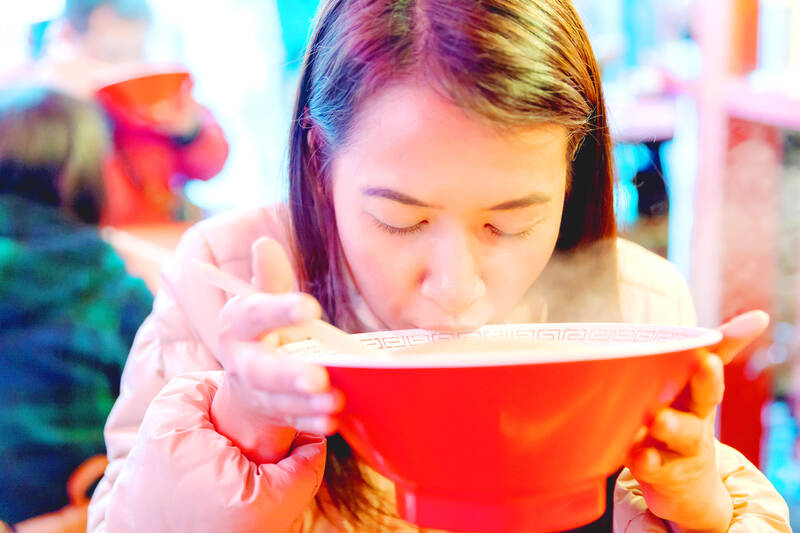Continued from yesterday(延續自昨日)
https://www.taipeitimes.com/News/lang
As with many aspects of Japanese culture, there is etiquette to follow when you enjoy noodles. To fully experience noodles like a local on your next visit to Japan, consider these simple guidelines.

Photo: Shutterstock 照片:Shutterstock提供
First, be careful where you put your chopsticks. Don’t leave them sticking up in the broth or set them at the side of the bowl. When you have finished eating or if you’re taking a break, place them on the chopstick rest next to the bowl. Also, it is impolite to wave chopsticks around or bring them above mouth-level. Second, don’t take too many breaks or spend a long time eating your meal. Noodles taste the best when they are freshly boiled. It is proper etiquette to eat them swiftly. Third, it is a sign of respect to finish everything you order. That means people should try to empty their bowls by drinking the broth left after finishing the noodles. Diners are encouraged to lift the bowl to their mouth, just as if it were a giant cup.
Visitors to Japan may also notice that Japanese people love to slurp their noodles. Although making such noises while dining may seem rude in many countries, in Japan, slurping shows appreciation and indicates that diners enjoy the taste. People say that taking air into one’s mouth with each slurp also enhances the flavors of the broth and noodles. Lastly, people slurp to help them finish their noodles as fast as possible, which, of course, is the best way to enjoy them.
和日本文化的許多方面一樣,當你在享用麵食時也有禮儀要遵循。要在你下次造訪日本時像當地人一樣充分體驗享用麵食,請花點時間看看這些簡單的指南。
首先,小心你放置筷子的地方。不要讓它們豎立在湯底中或放在碗的一側。當你用完餐或休息時,將它們放在碗旁邊的筷架上。此外,揮動筷子或將它們舉到嘴巴以上都是不禮貌的。第二,不要休息太久或花太長時間用餐。麵條在剛煮好時味道最好。迅速食用是正確的禮儀。第三,吃完你點的所有食物是一種尊重的表示。那意味著人們應該盡量在吃完麵條後把剩下的湯汁喝光。用餐者被鼓勵像舉起巨大的杯子一樣將碗舉到嘴巴前喝。
造訪日本的遊客可能也會注意到日本人很愛吸麵條。雖然在許多國家中,用餐時發出這樣的聲音可能看似不禮貌,但在日本,吸吮是表示讚賞,表明用餐者很喜歡食物的味道。有人說,每次吸吮時將空氣帶入口中還能增強湯汁和麵條的風味。最後,人們吸吮以幫助自己盡快吃完麵條,這當然是享用它們的最佳方式。
What Did You Learn?
1. According to the Day 1 passage, which of the following statements is true?
(A) In Japan, those who enjoy eating udon noodles usually prefer hot weather
(B) Ramen noodles are typically accompanied by wasabi and seaweed
(C) If you want to get full, it is recommended to order udon noodles
(D) Japanese people brought noodles to China in the 9th century
2. It is summertime. Rachel is placing an order for noodles at a Japanese restaurant. She would like something to cool her off a bit, but is not fond of very thick noodles. What kind of noodles would she probably choose?
(A) Ramen (B) Udon (C) Soba (D) Instant noodles
3. What is viewed as proper when eating noodles in a Japanese restaurant?
(A) Leaving soup broth in the bowl
(B) Pointing with your chopsticks
(C) Taking a long time to finish
(D) Consuming all the food you’ve ordered
4. What is NOT a reason Japanese people slurp their noodles while eating?
(A) It is said to increase the flavor
(B) It shows that one enjoys the meal
(C) Slurping is considered a beautiful sound
(D) Slurping noodles helps one eat quickly
答案:1. C 2. C 3. D 4. C
Word in Use
1. aspect n. 方面,層面
The feature report examines every aspect of the education system in the US.
這篇專題報導檢視了美國教育體制的各個層面。
2. guideline n. 指南,準則
A new set of teaching guidelines for the faculty was put in place.
一套針對全體教職員的新教學方針已開始實施。
3. impolite a. 不禮貌的,無禮的
It’s impolite to chew with your mouth open while you are eating.
吃東西時嘴巴張開是很不禮貌的。
4. freshly adv. 剛剛做∕磨∕摘好地
I bought some freshly baked bread from the bakery this morning.
今天早上我從麵包店買了一些新鮮出爐的麵包。
5. swiftly adv. 迅速地
The waiter swiftly got me a cup of coffee.
這名服務生迅速為我送上一杯咖啡。
Practical Phrases
1. as with... 和…一樣
As with most new products, there will be some problems at first.
和大多數的新產品一樣,一開始總會有些問題。
2. stick up 豎起;向上突出
stick vi. 突出,伸出
The cat arched its back with its fur sticking up when it sensed an approaching stranger.
在察覺有個陌生人正在接近牠時,這隻貓拱起背來且毛都豎直了。
3. encourage sb to V 鼓勵某人去做……
encourage vt. 鼓勵
My parents encouraged me to study abroad upon graduating from college.
爸媽鼓勵我大學畢業就出國深造。
聽文章朗讀及講解: https://ivy.pse.is/455bfu
本文出自常春藤解析英語雜誌: www.ivy.com.tw

A: When is the Lantern Festival? B: The festival is celebrated on the 15th day of the first month of the lunar calendar, which fell on Feb. 12 this year. A: Oh no! Did I miss the 2025 Taipei Lantern Festival? B: Yes, you did. But you can still go to the 2025 Taiwan Lantern Festival in Taoyuan, which will run until this Sunday. A: Let’s go admire the exuberant lanterns. A: 元宵節到底是哪一天? B: 就是農曆1月15日啊,今年則落在國曆2月12日。 A: 喔不,我是不是錯過了2025台北燈節? B: 是的,但你還可以去桃園的2025台灣燈會,活動將持續至週日。 A: 那我們去欣賞豐富的花燈秀吧! (By Eddy Chang, Taipei Times/台北時報張聖恩)

A: What’s the theme of the 2025 Taiwan Lantern Festival’s main lantern? B: The theme is “Paradise,” and the main lantern is a snake-shaped “infinity” symbol that features a lighting show every half an hour. A: Cool, I heard that there are over 300 lanterns. B: There are even giant lanterns in the shape of Pikachu and some other popular Pokemon characters. A: Let’s go now. A: 2025台灣燈會主燈的主題是什麼? B: 主題是「無限樂園」!主燈的造型則是蛇形的數學「無限號」,主燈每半小時還有一次燈光秀。 A: 酷喔,聽說總共有300多件花燈作品。 B: 甚至還有皮卡丘和其他熱門寶可夢角色的巨型花燈呢。 A: 哇我們現在就出發吧! (By Eddy Chang, Taipei Times/台北時報張聖恩)

本文由生成式AI協作,本刊編輯編修。 Tucked away in southwestern Taiwan, Yunlin County is a treasure trove of cultural heritage, rich history, and natural beauty. From its stunning temples and glove puppetry to historical architecture and picturesque landscapes, Yunlin rewards those who venture off the beaten path. Yunlin is renowned for its flourishing temple culture. Temples in this region are not merely places of worship but also communal centers where people gather for festivals, rituals, and social functions. One of the most notable temples here is the Beigang Chaotian Temple, which was built more than 300 years ago and is dedicated to Matsu, the sea

Nestled within the heart of Taipei, National Taiwan University (NTU) contains a grand and spacious sanctuary where nature and academia come together in perfect accord. Across its expansive 111-hectare campus, NTU reveals a landscape rich with history, lush greenery, and a thoughtfully preserved ecosystem. This tranquil haven invites visitors to take their time wandering among the elegant buildings, to admire the rare plants, and to experience a space that exudes quiet inspiration. Zhoushan Road: A Gentle Prelude to NTU’s Tranquility Beginning at Gongguan MRT Station, the enchanting avenue Zhoushan Road leads visitors into NTU shaded by golden rain trees, cottonwoods, and Javanese